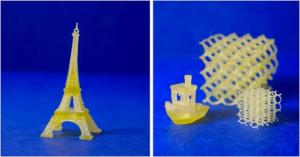
Bio-based resins offer recyclable future for 3D printing
BIRMINGHAM, WEST MIDLANDS, UNITED KINGDOM, November 12, 2024 /EINPresswire.com/ -- Researchers from the University of Birmingham, UK, have designed a new type of photocurable resin, that offers two key benefits over existing 3D printing resins: it is made entirely from bio-sourced materials, and can be 3D printed, recycled, and then printed again.
While current 3D printing usually relies on epoxies or acrylics, which come mostly from petrochemical feedstock, the new resin is made from lipoic acid, a naturally occurring fatty acid molecule that is 100% bio-sourced, and commonly sold as a dietary supplement.
Additionally, the recyclability of conventional resins is still limited, because they rely on irreversible bonds created when the resin cures (hardens), and this poses challenges when the material needs to be recycled.
In contrast, the resin designed by the Birmingham team can be printed, then broken back down to its constituent parts, recycled and reprinted, with the addition of just a small amount of photoinitiator to maintain the material’s curable properties, meaning 3D printed products can be recycled in an almost fully closed-loop system.
The new resin is compatible with light-initiated printing techniques such as DLP, SLA or by direct ink write, or InkJet printing, and provides high fidelity, with resolution down to 0.05mm.
The researchers who invented the resin were led by Professor Andrew Dove from Birmingham’s School of Chemistry.
They have shown the resin can complete two ‘recycles’, and anticipate further recycling is possible, meaning the material could be used in sustainable packaging, industries that do rapid prototyping, optical and electronic devices, construction and architecture, or fashion and jewellery.
University of Birmingham Enterprise has filed a patent application covering the composition of the resin, and its use in 3D printing, and is now seeking to licensing or co-development partners. For commercial or licensing enquiries contact Jon Roberts.
Ruth C Ashton
University of Birmingham Enterprise
r.c.ashton@bham.ac.uk
Visit us on social media:
X
LinkedIn
Distribution channels: Automotive Industry, Chemical Industry, Electronics Industry, Food & Beverage Industry, Manufacturing
Legal Disclaimer:
EIN Presswire provides this news content "as is" without warranty of any kind. We do not accept any responsibility or liability for the accuracy, content, images, videos, licenses, completeness, legality, or reliability of the information contained in this article. If you have any complaints or copyright issues related to this article, kindly contact the author above.
Submit your press release
